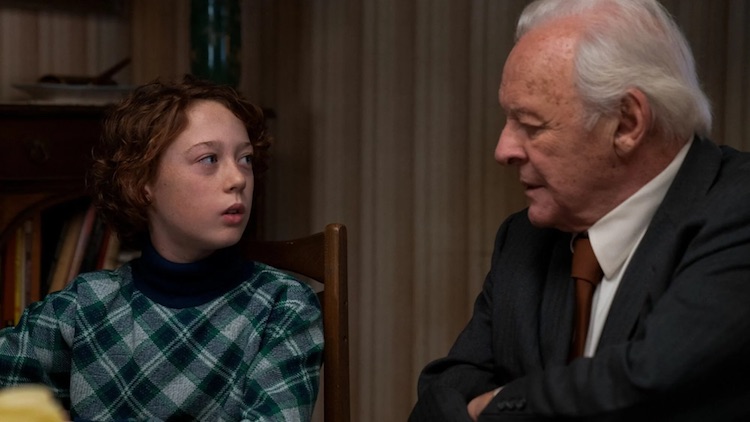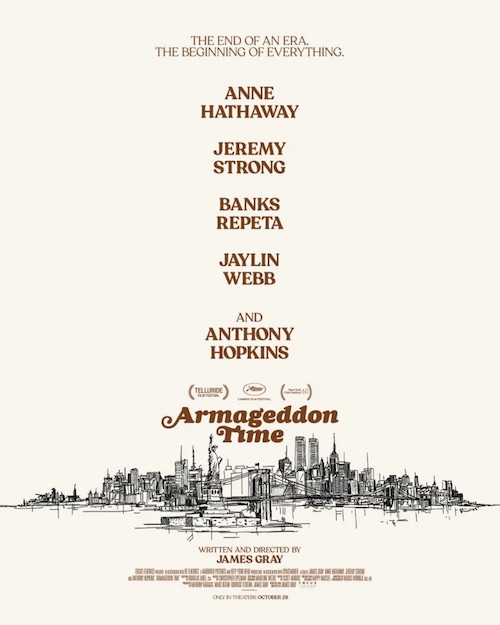
Movie Review: Armageddon Time
What We Liked
What We Didn't Like
Armageddon Time’s title is a reference to the song by Willie Williams, covered by The Clash (spelled “Armagideon Time”), whose lyrics contain the line “a lot of people won’t get no justice tonight.” The title also calls to mind a world on the brink of war or a period of finality.
All these meanings tie into the themes of James Gray’s semi-autobiographical drama. It’s a movie about a young man discovering that factors beyond his control have afforded him a safety and privilege unavailable to others. It’s about a nation wracked with Cold War anxiety approaching the back half of the Reagan era. And it’s about reckoning with the realization that the institutions and worldviews that shaped you might also be better left behind.
Armageddon Time tackles some of these themes with more finesse than others, but when it works, Gray’s latest is a thoughtful, emotional and sometimes deeply moving story. As always, the director’s eye for composition and skill with actors creates a film that is always interesting and often compelling, even when it tosses subtlety to the wind.
Banks Repeta stars as Paul Graff, a sixth-grade boy growing up in 1980s Queens, in that tentative state where childhood attachments are still readily available but the complexities of adulthood are just beginning to reveal themselves. The film opens on the first day of school when, after getting caught passing along a drawing that ridicules his teacher, Paul befriends fellow trouble-maker Johnny (Jaylin Webb), a Black boy who lives with his grandmother and has been held back a year.
It quickly becomes apparent that Paul enjoys advantages unavailable to Johnny because of the color of his skin, where he lives and his parents’ investment in his life. The boys’ teacher punishes them both for acting up on the first day, but reserves special animosity for Johnny, whom he berates and mocks for being held back for repeating the sixth grade. Both boys have interests and skills that hint at deeper potential — Johnny’s obsessed with NASA and Paul is a budding artist — but they experience different forms of nurturing and discouragement. Johnny’s aware, and constantly informed, by teachers and even strangers, that his road will be harder because of his skin color; it’s suggested that Paul may have a learning disability and a problem focusing, but he also has access to more academic assistance when he’s enrolled in a rich private school, as well as adults willing to intercede on his behalf.
The boys’ relationship and Paul’s gradual realization of his privilege comprise the heart of the film and, despite its good intentions, it’s the least successful material. Gray’s script is too often obvious, pointing out the inequities between Johnny and Paul’s lives in a way that it feels like there should be a chyron flashing “THIS IS WHITE PRIVILEGE” underneath. It’s not that anything Gray is saying is inaccurate; it’s just an inelegant handling of the material. But it could also be argued that as the work of a man looking back on his own childhood, Gray’s script is pointing out how easy it is for youths to be oblivious to what, in hindsight, should appear obvious.
But it doesn’t forgive the larger problem of failing to make Johnny a three-dimensional character. Instead, he’s a cipher who only exists as a tool to reveal the hard truth about the world to Paul. There’s a very brief glimpse of Johnny’s homelife, but other than that, he’s only seen through Paul’s eyes, serving only as a tool for the white protagonist’s growth. Webb’s performance is charismatic and touching, but it can’t paper over the fact that Johnny is nothing more than an object lesson.
More successful are the film’s attempts to portray the way bias and casual racism are, unfortunately, the wallpaper of too many families. Paul’s mother (Anne Hathaway) and father (Jeremy Strong) would not consider themselves racist; to many, they would be the model of a liberal American household in the ‘80s. But Gray’s script is observant about how the parents have a specific fear of a Black teenager hanging around their neighborhood, or how they normalize referring to the food and culture of other ethnicities with derogatory terms. Gray puts a special emphasis on the hypocrisy of racism coming from within Graff’s Jewish family, whose own heritage involves horrendous persecution. The only voice of consistent reason comes from Paul’s grandfather (Anthony Hopkins), whose mother experienced violent racism living in Ukraine; he offers the only voice telling Paul to “be a mensch” and stand up for the marginalized. Jessica Chastain shows up for one scene in a cameo that drew chuckles because of how explicitly it links Paul’s parents’ idea of the American dream to figures who would lead its curdling nearly 40 years later.

Anthony Hopkins (right) and Banks Repeta in “Armageddon Time.”
Drawing loosely from his own experiences, Gray creates a nuanced and lived-in world for Paul, with family members who are richly drawn and complex, each crafting an image of success and strength to mask their own insecurities and anxieties. Hathaway gives a strong performance as his mother, who throws herself into her position as PTA president and tries to shield her sons from the sadness and fear that plague her. Strong does complex work as Paul’s mercurial father, who brandishes his intelligence and seems afraid of emotion, masking his own feelings of failure and his violent temper. A scene between Strong and Repeta near the end is one of the best in the film, as Strong’s character acknowledges the unjustness of the world and the ways he accepts it so that his family can have some stability; in that moment, he creates a character who earns our sympathies while revealing his own pathetic nature. It’s remarkable work. Hopkins walks on for a few scenes to provide Paul with his moral compass, a role model who is warm and wise, yet tortured by his own demons.
Repeta portrays a thoughtful protagonist at a crucial age. Paul is young enough to still play with model rockets with his grandfather and get excited about field trips to the museum. But he’s also at the point where he begins to see the cracks in a facade he thought was normal and recognize the absurdity and injustice in what his family and teachers accept as normal. Gray creates a rich and intimate look at a boy living in a world set up to reward one group at the expense of others and hellbent on exerting its control to applaud and champion its own versions of what success looks like. The question at the center of Apocalypse Time is not whether the world is unjust (that question is settled quite clearly); it’s whether Paul will surrender to its systems or reject them, an answer provided in the film’s quietly powerful final moments.
From a plot perspective, Armageddon Time may seem broad and obvious, and it’s a tragedy that the film’s one character of color is reduced to such a two-dimensional portrayal. But taken as a character study and a reminiscence of growing up in a world of complexities and contradictions, it’s often moving, thoughtful and powerful. It’s a flawed, but often impactful look at a world that is both very specific and all too familiar.



